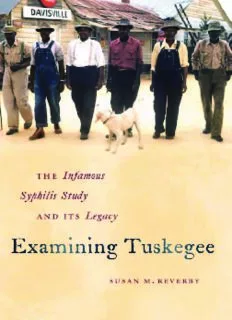
Examining Tuskegee: The Infamous Syphilis Study and Its Legacy (The John Hope Franklin Series in African American History and Culture) PDF
Preview Examining Tuskegee: The Infamous Syphilis Study and Its Legacy (The John Hope Franklin Series in African American History and Culture)
Examining Tuskegee The John hope Franklin SerieS in African American History and Culture Waldo e. Martin Jr. & patricia Sullivan, editors SuSan M. reverby Examining Tuskegee the Infamous Syphilis Study and itS Legacy The University of North Carolina Press chapel hill © 2009 the univerSity oF north carolina preSS all rightS reServed ManuFactured in the united StateS oF aMerica Parts of this book have Designed by Courtney Leigh Baker and set in Minion Pro with been reprinted with permis- Letterpress Text Display by Tseng Information Systems, Inc. sion in revised form from The paper in this book meets the guidelines for permanence “History of an Apology: From Tuskegee to the White and durability of the Committee on Production Guidelines House,” Research Nurse 3 for Book Longevity of the Council on Library Resources. (July/August 1997): 1–9; Library of Congress Cataloging-in-Publication Data “Rethinking the Tuskegee Reverby, Susan. Syphilis Study: Nurse Rivers, Examining Tuskegee : the infamous syphilis study and its Silence, and the Meaning of Treatment,” Nursing History legacy / Susan M. Reverby. Review 7 (Fall 1999): 3–28; p. ; cm. — (John Hope Franklin series in African American “More Than Fact and Fiction: history and culture) Cultural Memory and the Includes bibliographical references and index. Tuskegee Syphilis Study,” iSbn 978-0-8078-3310-0 (cloth : alk. paper) Hastings Center Report 31 1. Tuskegee Syphilis Study. 2. Human experimentation in (September–October 2001): medicine—Alabama—Macon County—History. 3. Syphilis 2–8; and “‘Special Treatment’: —Research—Alabama—Macon County—History. i. Title. BiDil, Tuskegee, and the ii. Series: John Hope Franklin series in African American Logic of Race,” Journal of history and culture. Law, Medicine & Ethics 36 [dnlM: 1. Tuskegee Institute. 2. United States. Public Health (Fall 2008): 478–84. Service. 3. Syphilis—History. 4. African Americans—History. The University of North 5. History, 20th century. 6. Human experimentation—History. Carolina Press has been a 7. Informed consent—History. 8. United States government member of the Green Press agencies—History. 9. Universities—History. Wc 160 r452e 2009] Initiative since 2003. r853.h8r48 2009 174.2'80976149—dc22 2009016648 13 12 11 10 09 5 4 3 2 1 For liz SiMS & cynthia WilSon, who keep making history, and in memory of charlie WeSley pollard & herMan ShaW This page intentionally left blank Contents Acknowledgments { ix } introduction { 1 } Race, Medical Uncertainty, and American Culture Part I. testImony 1 hiStorical contingencieS { 13 } Tuskegee Institute, the Public Health Service, and Syphilis 2 planned, plotted, & oFFicial { 29 } The Study Begins 3 alMoSt undone { 56 } The Study Continues 4 What MakeS it Stop? { 73 } 5 teStiMony { 86 } The Public Story in the 1970s Part II. testIfyIng 6 What happened to the Men & their FaMilieS? { 111 } 7 Why & WhereFore { 135 } The Public Health Service Doctors 8 triage & “poWerFul SyMpathizing” { 152 } Eugene H. Dibble Jr. 9 the beSt care { 167 } Eunice Verdell Rivers Laurie Part III. travelIng 10 bioethicS, hiStory, & the Study aS goSpel { 187 } 11 the court oF iMagination { 204 } 12 the political Spectacle oF blaMe & apology { 216 } epilogue The Difficulties of Treating Racism with “Tuskegee” { 227 } appendix a Chronology { 241 } appendix b Key Participants’ Names { 249 } appendix c Men’s Names { 251 } appendix d Tables and Charts { 257 } Notes { 263 } Bibliography { 333 } Index { 365 } A section of illustrations appears after page 108. Acknowledgments Big books take big time, and this was no exception. I never imagined when it started as a short article about the key nursing figure that it would take over my life for so long. For those who joined this journey and supported me, I have only gratitude for your patience and willingness to understand why it mattered. I am well aware of the political economy that makes scholarship pos- sible. My full-time position in Women’s Studies at Wellesley College is my bedrock and allowed for sabbaticals. I have held three “folding” chairs—the Whitehead Associate Professorship in Critical Thought, the Luella LaMar Professorship in Women’s Studies, and the Marion Butler McLean Professor- ship in the History of Ideas—during the time it took to research and write this book. The Social Science Students Summer Research Program provided three student assistants. I am deeply grateful that a number of fellowships made my research and writing possible. The American Association of Uni- versity Women, the National Endowment for the Humanities, the Radcliffe Institute and the W. E. B. Du Bois Institute at Harvard University, and the National Library of Medicine (Grant number 5 G13 LM009227-02) bought me the time to think and write for more than a few hours at a time. I started the research when at the Du Bois, began to write when I was at Radcliffe, and finished the first draft again at the Du Bois. I hope that Drew Gilpin Faust, Judy Vishniac, Skip Gates, and the other grantors think they invested wisely. The Du Bois fellows and staff members who became friends as I finished— Gretchen Long, Catherine Manegold, Patricia Sullivan, Patricia Hills, Hudita Mustafa, and Donald Yacovone—all listened and critiqued this work while sharing food and ideas. Many other scholars and writers have published on the “Study”—I am just the latest in this effort. I could not have done this if it had not been for
Description: